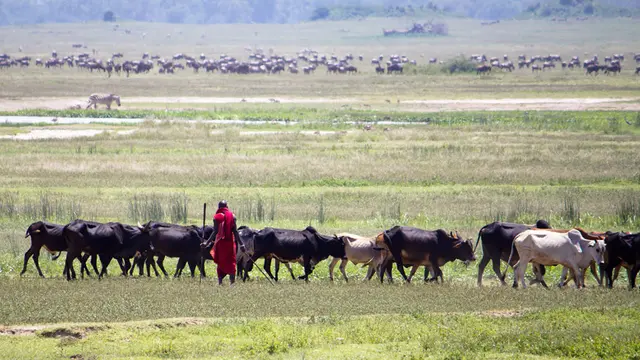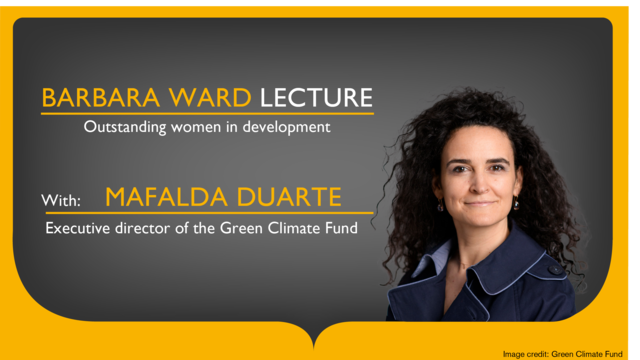Climate finance is vital to secure a future worth having
The Angolan Environment Minister argues that you cannot make a simple distinction between climate finance and money for other development issues.


Angola aims to achieve its mitigation goals through the promotion of renewable energy, stabilisation of agricultural emissions, carbon sequestration from the forestry sector and other activities (Photo: jbdodane, Creative Commons via Flickr)
A key issue dominating the landmark climate summit in Paris is that tricky subject of climate finance: who pays, how much, for what?
Some elements of the global discourse on the sums required to tackle the urgent climate change threat seem to think there is a simple distinction to be drawn between choosing to spend money on climate or other development issues.
But this simplistic rhetoric is damaging and puts lives at risk.
President dos Santos conveyed a message to the heads of state session at the 21st Conference of the Parties (COP21) from my country, Angola, one of the 48 countries (plus South Sudan) that the United Nations refers to as a Least Developed Country (LDC).
But being poorest in terms of GDP is not holding us back. We are rich in our desire to secure a robust and binding climate deal that limits the global mean temperature increase below 1.5 degree Celsius and leaves no one behind.
A spirit of greater ambition
We have been collectively working to embody the spirit of what we call for in the negotiating sessions: greater ambition.
The ambition starts now with strong mitigation targets, for a low-carbon future which protects lives and livelihoods as best we can, given the damage already done.
We are already seeing the devastating impacts of global warming in Angola and beyond.
Developing countries have generally been making great strides towards building stronger social and economic infrastructures, but climate change threatens to erase this progress.
At the time of writing, 47 out of our 49 states have put forward national climate plans or, as termed in the UNFCCC process, Intended Nationally Determined Contributions (INDCs).
he idea that climate change impacts might not affect food, health, water and education – some of the development issues offered as reasons not to provide climate finance – does not hold up under serious scrutiny.
This excerpt from my own country's INDC demonstrates the irreconcilably interlinked nature of these issues:
"The Angolan economy has been hit hard by the impact of climate change expressed as prolonged drought, damaging flash floods, forest fires, reduced crop production, reduced water resources, impacted fishing resources, etc. Many of the economy sectors of Angola have been impacted by climate variability in the last 30 years. However, there are economy sectors which are extremely vulnerable to impacts resulting from the extreme events and which will pose not only serious livelihood and direct health risks but can also affect the economic potential and national food security. Therefore within the context of this INDC, Angola prioritises the implementation of Adaptation measures in the following main sectors: agriculture, coastal zone, land-use, forests, ecosystems and biodiversity, water resources and health."
Why wait for a low-carbon future?
There is also an assumption that developing economies will want to create an infrastructure that is based on fossil fuels, and indeed some countries do reference coal use.
But many countries wish to bypass building in a fossil fuel reliance, when we can go straight to a low-carbon future, full of technological ingenuity.
My own country's INDC highlights that even as an oil-producing nation, we have a significant potential for growth in renewable energy, and these projects are a priority in our energy sector strategy as we develop.
Fatima Denton, director of the UN Economic Commission for Africa's (UNECA) Climate Policy Initiative, has stated that climate change could help create a new paradigm for Africa.
Climate change brings threats, but it also opportunities for positive change and that is the spirit with which we must tackle the negotiations and climate finance flows in Paris.
No simple finance fix
Both public and private finance have their place and will be required to deliver effective responses.
There is no one simple finance fix, as this is not a simple problem. Mitigation projects in Middle Income Countries may be a better fit for private and loans-based finance, whereas the LDCs are in urgent and immediate need of access to public funds.
I warmly welcome recent pledges totalling US $248 million to the Least Developed Countries Fund (LCDF), the only dedicated climate fund channelling money to adaptation projects for the world's poorest nations.
However the long-empty fund had 35 projects waiting for around $255 million worth of resources to be made available. The amount pledged – while an encouraging step forward in the negotiations – barely covers those outstanding urgent projects.
Despite that, to suggest that business as usual will prevail is a sadly jaded and out of touch take on these landmark discussions. Our COP21 hopes have more in common than not. These discussions are already becoming transformative action, of which we will see more as we progress.
This should be how we look back in years to come and measure our success in Paris, or the cost will be measured in far more than trillions of dollars. It will measured in stolen futures and lost lives.
Maria de Fátima Jardim is Angolan Minister of Environment. Angola currently holds the seat of the chair of the Least Developed Countries Group (LDCs) within the UNFCCC negotiating process.


